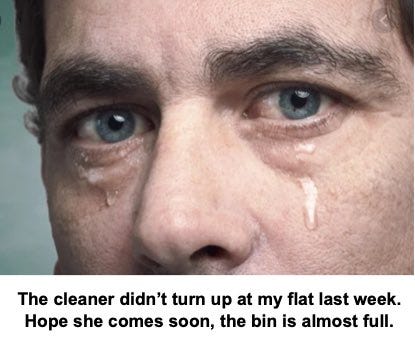Life is too easy
I sometimes worry about the most trivial things. Before covid, my sickness-senses would tingle whenever someone sneezed in the office. I can really do without getting sick just before a holiday. And what about trains? They're always late which is a constant source of annoyance.
My stressing about stupid things is probably above-average but it's impossible to know. I've had a thought that maybe because I live a comfortable life, it means I give the minor things disproportionate concern. Maybe if I was struggling to make the bills or had health problems, then the smaller things wouldn't make the radar. It turns out this has a name and it's called "prevalence-induced concept change".
Living too comfortably
A study published in Science Magazine gives weight to the idea that living an easy life makes us re-define what problems are in a phenomenon called "prevalence-induced concept change". One of the Harvard researchers, Daniel Gilbert said “Another way to say this is that solving problems causes us to expand our definitions of them. When problems become rare, we count more things as problems. Our studies suggest that when the world gets better, we become harsher critics of it". Supporting evidence of this has to be what we refer to as "First World problems".
First World problems
According to Wikipedia, the term First World problems first appeared in 1979 but gained popularity in 2005 where it became an Internet meme. Examples of First World problems include: online deliveries turning up late, slow/no wifi, getting a bad haircut, stuck in traffic/delayed train and many more. The memeification shines a light on how decadent and entitled society has become.
Life, not that long ago
It's hard to believe that life was so tough not that long ago. It wasn't until 1933 that Britain restricted the use of children under 14 in employment, with similar laws in the United States in 1938. In Victorian Britain, the working-class made up about 80 percent of the population. That meant if you or I were born a bit earlier then our lives would have been very different. In Europe, child labour was encouraged to build character. Starting work by age six was normal but sometimes as young as four.
We could have easily been a chimney sweep (mostly boys but sometimes girls). Young children were sold by their parents, taken from orphanages or kidnapped from the streets and then bound to their master until adulthood. There was no pay and the young chimney sweeps were often deprived of food to keep them thin which helped to get into tight chimneys. For motivation, the master would sometimes light a small fire to encourage the children to speed up or climb higher. Suffocation, being burnt to death and cancer caused by the carcinogenic soot were all common. Nothing like Marry Poppins.

It wasn't just the chimney sweeps that had it tough. Throughout the first and much of the Second Industrial Revolution, regardless of age, you were paid a pittance, you lived in squalor surrounded by disease and your work was unbearable. What work could you have been doing? Well, you could have been a mudlark, someone who scavenged in the mud for wood, coal or anything of value when the river tide was out. Mudlarks were surrounded by raw sewage and dead corpses, a small wound could have easily been a death sentence. To make thing worse, finding anything of value was made tougher by toshers who worked further up the chain in the sewers where they scavenged for anything of value before it got to the river.
If you were a woman, it was more common to find you in the "slop shop" which were sweatshops for producing cheap clothes, that or working as a prostitute. With close to no opportunities, a few years on the game was seen as a good way to save some money, however, this was often cut short by sexually transmitted diseases that had no cures and meant a trip to the "foul ward". So next time you're having a bad day in the office, spare a thought for these unfortunate little children, women and men that had it so tough not that long ago.
Generation snowflake ❄️
Snowflake has become a derogatory term used to describe someone that's overly emotional or has an inflated sense of entitlement and ego. The novel and film Fight Club is thought to be the origin, with this quote: "You are not special, you are not a beautiful and unique snowflake".
We've gone from a polar extreme of child slavery and hardened personalities to mollycoddling and emotionally fragile. Renowned social psychologist Jonathan Haidt puts the blame down to overly-protective parenting and social media. While being interviewed on the Joe Rogan show, he went on to say:
"Someone calculated at present rates of abduction by strangers if you put your kid in a car and you go into a store and you leave the windows open your kids sitting there in the parking lot you'd have to stay in that store for 700,000 years before your kid is likely to be abducted … one of the sticking points here is that we're afraid to let our kids out … I am selling the idea that that the gigantic rise in mental illness of teenagers is caused in part because we have denied them the experiences of independence they need to develop their basic social sense and so I am selling the idea that we've totally botched this and we need to undo it"
Continuing the theme of parenting, Will Storr's book Selfie mentions a study by the University of Amsterdam on the levels of narcissism in 565 children as well as the parenting styles of their caregivers. The conclusion was: "The more parents overvalued their kids, the more narcissistic their kids had become".
The question then arises, does all this parenting make better human beings? While stuffing children back up chimneys isn't the answer, there's probably a middle ground.
The term parenting only became a thing in the 70s

We're all Snowflakes
"When life is too easy for us, we must beware or we may not be ready to meet the blows which sooner or later come to everyone, rich or poor"
Eleanor Roosevelt
While some of today's generations may be less emotionally resilient than others, in the grand scheme of things, we're all snowflakes in comparison to the generations that precede most of ours. The Lost Generation and Greatest Generation were reared before the concept of parenting existed and when children were mostly conceived as economic assets for generating income vs today where children are an emotional asset that deplete income.
The rise of technology and improved living standards has eroded our resilience and why wouldn't it? As life becomes easier we become weaker. But at some point, we become so weak, we snap.
Is life better when it's tough?
Sebastian Junger's thesis in the book Tribe is that humans over the years have swapped belonging for excessive safety. He writes "The sheer predictability of life in an American suburb left me hoping—somewhat irresponsibly—for a hurricane or a tornado or something that would require us to all band together to survive". One interview in his book that stuck with me was the one with journalist Nidzara Ahmetasevic when discussing the Bosnian war.
"In Bosnia—as it is now—we don't trust each other anymore; we became really bad people. We didn't learn the lesson of the war, which is how important it is to share everything you have with human beings close to you. The best way to explain it is that war makes you an animal. We were animals. It's insane—but that's the basic human instinct, to help another human being who is sitting or standing or lying close to you."
When asked if people had been happier during the war. Ahmetasevic replied, "We were the happiest, and we laughed more".
FOMO = life is too easy
From my first-hand experience, "prevalence-induced concept change" is real, we invent problems when they don't exist. It's why FOMO has become such a widely used term. Life is too easy to the point that one of life's biggest problem is the fear that originates from comparing our lives to others. FOMO is a sign that life has become too comfortable.
Stoicism
The rising interest in stoic philosophy is perhaps in part because modern life is too comfortable. Stoics encourage the practice of regular negative visualisation in which the practitioner imagines bad situations, such as losing a job, a loved one or their own life.
Some stoics don't just imagine but act out the negative scenario, for example, living as a poor person would for a day -- wearing insufficiently warm clothes on a cold day, going hungry and not using technology. For a life that rarely faces a challenge, practising negative visualisation prepares you for when things go wrong and makes you grateful for what you have.
Easy life = boring life
"If things are too easy, life is a whole lot less interesting"
Marian Wright Edelma
While I don't envy working 16 hour days in a cotton mill as a child labourer in Victorian times, the polar opposite isn't nirvana. Many of us have this utopian dream of living an easy life in retirement, receiving money while doing nothing. The truth is it would be mind dumbing. Too many of us are spoilt, take life for granted and forget that life is meant to have real challenges. So instead of aspiring to live a comfortable life, think how you can make it more uncomfortable.









